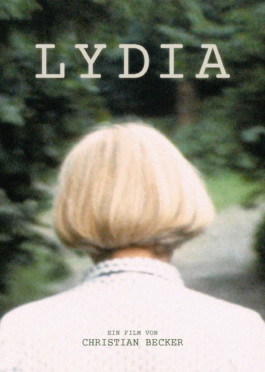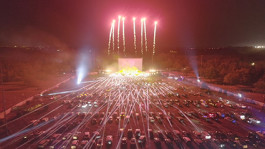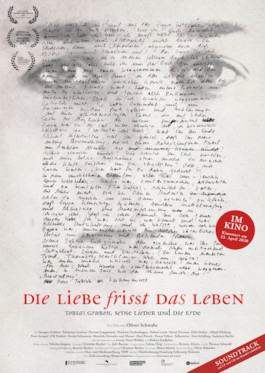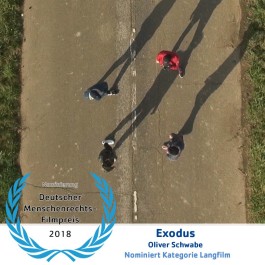


DOCUMENTARY

LYDIA
a short film by Christian Becker
LYDIA - filmed at the end of the 1970s and written down in diary sketches in 1992, the film tells the story of Lydia and Wolfgang B.'s life over two decades.
She, a translator of French literature, he, a professor of Romance studies. Between life crisis and joie de vivre, full of passion and disciplined work, driven by convictions and doubts and the fear of a deadly second tumor, their Super 8 recordings and Wolfgang's diary texts tell in fragments of the beauty and the adversity of a symbiotic marriage and yet at the same time of a whole life.
DIRECTOR/WRITER Christian Becker
DRAMATURGY Oliver Schwabe
SPEAKER Guido Renner
MIXING Peter Simon
MUSIC Aurelio Valle, Enrico Caruso, Johannes Brahms
SPEECH RECORDINGS Ping Studios
LEGAL DECLARATION Rolf Bremenkamp
FILM MANAGEMENT Kerstin Becker
FILM SCREENING Centric Miet- und Digitalisierservice e.K.
a field recordings film production
supported by the Film- und Medienstiftung NRW (P2)
Award of the NRW Competition of the 67th International Short Film Festival Oberhausen
Award of the City of Duisburg at the 43rd Duisburger Filmwoche

The return of drive-in theaters
A movie by Oliver Schwabe
WDR Television; Friday, July 10, 2020, 8:15 p.m. to 9:00 p.m.
The return of the drive-in movie theaters WDR Mediathek
They were as good as extinct - now they're back. Drive-in cinemas are making a big comeback all over Germany. Due to the restrictions imposed by the coronavirus pandemic, cinemas remain closed. However, the screens are allowed to flicker in the open air.
Most recently, there were just two drive-in cinemas in North Rhine-Westphalia, marginal existences in the shadow of the large multiplexes. But under coronavirus conditions, open-air screenings have quickly become an alternative. After just over two months, the one hundredth application in North Rhine-Westphalia was approved. Large parking lots and shooting ranges quickly became drive-in cinemas.
The parking lot at Paderborn-Lippstadt Airport is an ideal location and the drive-in cinema at Phoenix-West in Dortmund perhaps offers the most beautiful backdrop: the colorfully illuminated former blast furnace rises up behind the screen, complete with sunset against an impressive industrial backdrop. The audience has a safe feeling within their own four (tin) walls, living “social distancing” in their own car, but still within a cinema-enthusiastic community.
While the sound used to come from loudspeakers that were hung in the car, today it comes via its own FM frequency. 6,000 watt projectors project the films onto screens of up to 540 square meters. Powerful LED walls even allow screenings in daylight.
For many guests, it is their first visit of this kind, while others have remained loyal to the drive-in movie theater for decades. Memories of exciting movies, first kisses and steamed-up windows in the Beetle come back to life. “The return of drive-in cinemas” goes to the most unusual places and also shows the charm of the two cinemas in Cologne and Essen that have always existed.
The “drive-in movie theater” attraction came from the USA in 1961, initially to Frankfurt. The venues in Cologne-Porz and Essen then opened in 1967 and 1968. The concept suited the times. The motorization of Germans was steadily increasing. They were able to watch their favorite films in their favorite status symbol without the hassle of looking for a parking space.
In times of the pandemic, drive-in movie theaters are also making people inventive: the Cologne band BRINGS played the world's first concert in a drive-in movie theater. Together with DJ “Alle Farben”, the fans celebrated a techno party in Düsseldorf. Honking and flashing instead of dancing and jumping.
Author Oliver Schwabe documents the fascination of a rediscovered phenomenon in impressive images, aerial shots and time-lapse sequences: when the evening sky behind the screen turns red and the bright projection casts reflections on the many faces behind the windscreens of the cars, the audience briefly forgets the reason for the current boom in drive-in cinemas.
Camera_Jörg Adams
2nd camera_Max Lais, Nikolas Jürgens
Drone_Jörg Adams, Bastian Barenbrock, Jonathan Ulmer
Racing Drone_Tom Bärhold
Sound_Bastian Barenbrock, Jule Buerjes, Filipp Forberg
Editing_Christian Becker
Music_Aurelio Valle
Mixing_Thomas Hentschel
Speaker_Thorsten Schorn
Production assistance_Dominik Lehmann
Producers_Christian Becker, Oliver Schwabe
Production management WDR_Christian Wulf
Editor_Adrian Lehnigk
A production of
field recordings filmproduktion
on behalf of WDR

“Love eats life - Tobias Gruben, his songs and the earth"
Documentary film by Oliver Schwabe
a field recordings filmproduktion (Christian Becker) in co-production with interzone pictures (Klaus Maeck)
Available to stream:
mindjazz pictures Vimeo
and the soundtrack is available here, among others
Amazon Soundtrack
“Die Liebe frisst das Leben” traces the work of Tobias Gruben, who, even twenty years after his death, is still considered an almost undiscovered diamond of German pop culture. The singer of “Cyan Revue” and “Die Erde” inspired young bands such as “Messer” and “Isolation Berlin” to create cover versions. However, the film not only tells the story of an unfinished musical career, but also describes a son's ongoing struggle for recognition from his father. In interviews, partly unpublished music and letters, “Die Liebe frisst das Leben” takes us directly into the heart and mind of an almost forgotten musician who dies of an overdose shortly before his commercial breakthrough and whose lyrics and songs still touch us today.
With: Sebastian Gruben, Imogen Gruben, Heidrun Tuchenhagen, Florian Langmaack, Tobias Levin, Rocko Schamoni, FM Einheit, Alfred Hilsberg, Horst Petersen and cover versions by Paul Pötsch/Trümmer, Hendrik Otremba/Messer, Timm Völker, Tom Schilling, Fee Kürten/Tellavision and Isolation Berlin. And Gustav Peter Wöhler and Robert Stadlober as narrators.
Press reviews:
“Particularly through the conversations with Imogen Gruben, Oliver Schwabe succeeds in enriching the impressive portrait of an artist with a poignant and touching family story.” Junge Welt
“The way Schwabe's portrait interweaves the life and work of this enigmatic singer is captivating and highly exciting, the rediscovery of a superstar who never was one.” Die Zeit
“An intimate portrait that stands out from other films about music.” Konkret
***** 5 stars “ Informative, calmly narrated portrait of an impressive, multi-layered artist personality with impressive archive footage.” Spielfilm.de
Awards:
German Documentary Film Award 2020 Category Music Film
Visual design: Nikolas Jürgens
Editing: Christian Becker
Sound: Jule Buerjes
Sound design: Tobias Fleig
Color correction: Ronney Afortu
graphics: Thomas Schmidl
Film management: Kerstin Becker
Executive producer: Christian Becker
Co-producer: Klaus Maeck
Writer and director: Oliver Schwabe
a field recordings film production with interzone pictures
Supported by the Film- und Medienstiftung NRW (P2) and the FFHSH.

ASI MIT NIWOH - THE JÜRGEN ZELTINGER STORY
A documentary film by Oliver Schwabe
D 2018 | 90' | German OV
He drank with Lemmy from Motörhead and was briefly in prison. He was a street musician, redneck, weirdo, faggot and, above all, always a rebel - Jürgen Zeltinger is a Cologne icon. With his band, he covered Lou Reed and the Ramones in Kölsch in the 80s, and his socially critical songs such as Sozialamt are still roared along to today. Documentary filmmaker Oliver Schwabe accompanies the veteran rocker on tour, views old live footage and interviews friends and companions such as Wolfgang Niedecken and Heiner Lauterbach. He tells the fascinating story of the fat, bald street urchin with the short fuse who shaped an entire generation. (Festival catalog Filmfestival Cologne)
With Jürgen Zeltinger, Dennis Kleimann, Arno Steffen, Wolfgang Niedecken, Heiner Lauterbach, Christian Kahrmann, the Zeltinger Band and others!
Director&Writer Oliver Schwabe
Producer Christian Becker
DOP Nikolas Jürgens
Editing Christian Becker
Sound Jule Buerjes
Sound design Tobias Fleig
Color correction Mathias Lilie
Production field recordings filmproduktion
(Christian Becker/Oliver Schwabe)
Supported by the Film und Medien Stiftung NRW

EXODUS
Reports from four unaccompanied refugee minors
Documentary film by Oliver Schwabe
D, 2017, 60 min
With: Raman, Zana, Khalid and Ruhollah
Every year, tens of thousands of unaccompanied refugee minors make their way to Europe. The children are sent off by their parents to escape their war-torn home countries. In search of a better future, they embark on a highly uncertain journey.
In EXODUS, Raman, Zana, Khalid and Ruhollah tell the stories of their months-long escape and their arrival in Germany - directly and unfiltered. The film relies on the stories of the boys from Afghanistan and Syria and gives “the refugees” a face.
Nomination for the German Men's Rights Award 2018
Camera: Jörn Neumann, Nikolas Jürgens
Drone: Jonathan Ulmer
Sound: Jule Buerjes
Editing: Christian Becker
Color correction: Dany Schelby
Sound mixing: Thomas Hentschel
Graphics: Edi Winarni
Production management: Christian Becker
Production: field recordings filmproduktion
in co-production with Fürst Film
and supported by Bildersturm Filmproduktion
“Von der Beraubung der Zeit” // ON THE THEFT OF TIME, 2014
documentary, 79min
Director, writer: Daniel Poštrak and Jörn Neumann
Producer: Christian Becker & Oliver Schwabe
“Von der Beraubung der Zeit” tells the story of people who live in a parallel world that is mostly invisible to us - prison. They are there to pay their debt. The currency for paying off their deeds is their lifetime. When Helmut, Samuel and Kenny look into our world, a grid has been separating their view for many years. From inside prison, they share their hopes, desires and fears with us in conversations. In prison, they have found a way to draw pictures of the reality of their lives behind high walls by writing. These are stories of a life completely out of time.
Available on DVD via field recordings filmproduktion!
€ 15,90 (plus €3,00 shipping within Germany)
Please order at > info@field-recordings.de
Supported by: Filmstiftung NRW, Promotion of Young Talent (P3)
Press reviews:
“Daniel Poštrak and Jörn Neumann have created a touching film that illuminates the subject of time from a completely different perspective and makes the viewer think about it in a new way. The prisoners, who have committed serious crimes, are capable of words full of poetic power and depth, which provides many a surprise effect. The inmates' literary texts not only create a melancholy atmosphere, but also a veritable philosophical treatise on time. A very special kind of movie.” - Kino.de
“Three men who have been sentenced to long prison terms for serious crimes describe their everyday life in prison, which is characterized by monotony, lack of illusion and the feeling of having fallen out of time. Based entirely on the stories told by the men in their cells, the documentary uses simple but highly effective means to paint an impressive picture of the living conditions behind bars. In the observations of the remarkably reflective prisoners, the shortcomings of the German penal system also become palpable, without the film accusing the institution of prison as such or presuming to present an alternative solution.” - Jens Hinrichsen, FILMDIENST 14/2014